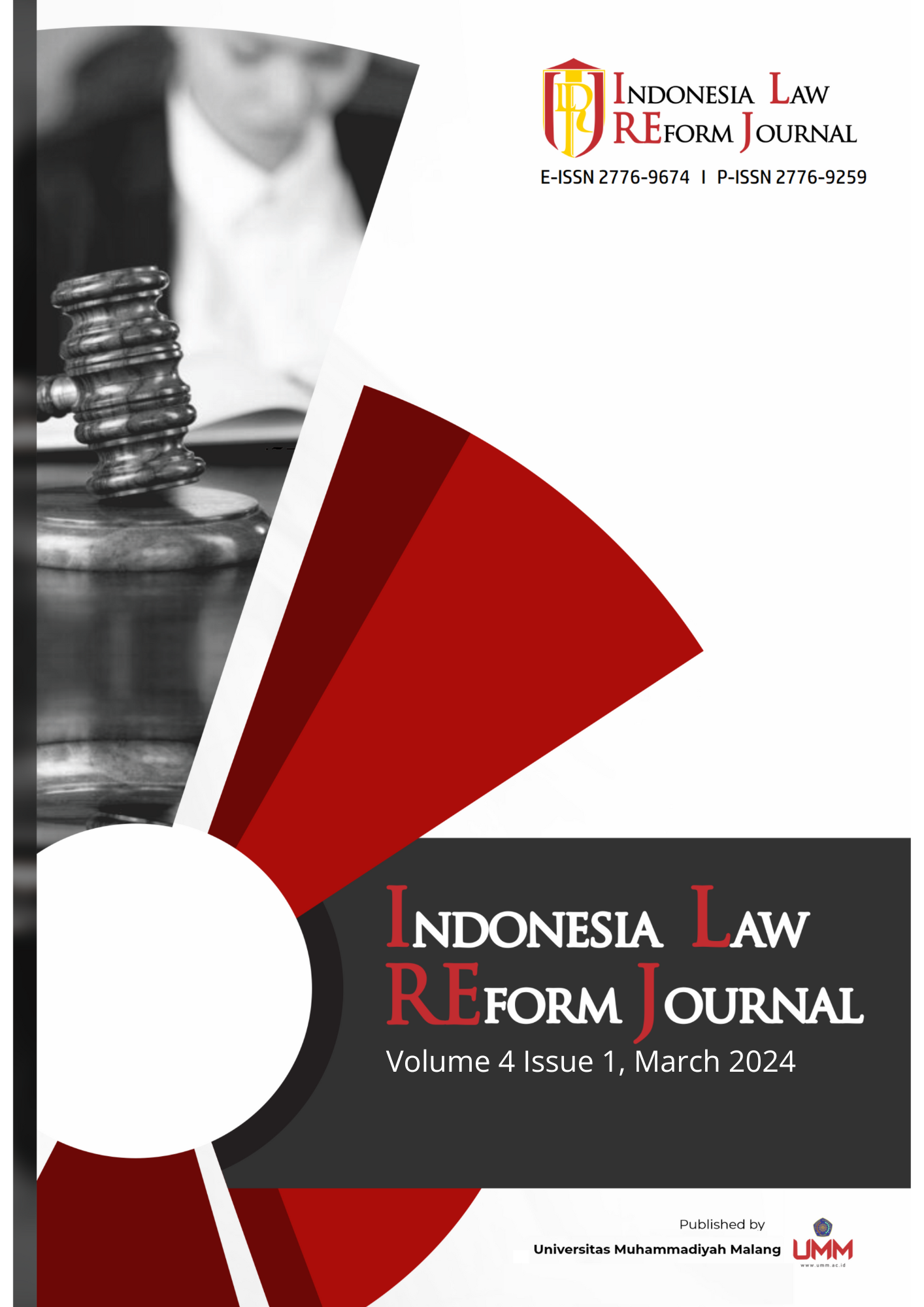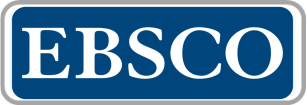The Indonesian Legal Framework to Mitigate Marine Plastic Debris
DOI:
https://doi.org/10.22219/ilrej.v4i1.32110Keywords:
Marine Plastic Debris, ASEAN Frame Work, SustainabilityAbstract
This study aims to analyse and identify the problem of plastic marine debris in Indonesia and in the ASEAN Frame. This research employed a normative approach involving the implementation of the ASEAN Framework, Law No. 32 of 2009 concerning Environmental Protection and management, based on the principle of sustainability. The government and the local Government's duties are to ensure that marine debris will be implemented in a good manner and based on environmentally sound management, as in line with Presidential Regulation No. 83 Year 2018 on Marine Debris Management. This study also uses qualitative methods to explain and analyze the phenomena and social dynamics of marine plastic debris. The ASEAN framework involves the encouragement of the preparation of regional action plans to combat marine plastic debris. This is important, considering that the four ASEAN countries (Indonesia, Vietnam, Thailand, and the Philippines) are the largest producers of marine plastic debris in the world, while Indonesia is involved in every stage of environmental diplomacy in ASEAN. The research results show that the measures taken by ASEAN range from the initiation stage to the implementation of the ASEAN Regional Action Plan to Combat Marine Debris in ASEAN Member States 2021 – 2025 including in Indonesia. Every state performs its own marine debris management, depending on the Area, population, mastery of technology and state budget.
Abstrak
Penelitian ini bertujuan untuk menganalisis dan mengidentifikasi permasalahan sampah plastik di laut di Indonesia dan dalam kerangka ASEAN. Metode penelitian yang digunakan adalah pendekatan normatif, peraturan perundang-undangan dengan mengimplementasikan Kerangka ASEAN, Undang-Undang Republik Indonesia No. 32 Tahun 2009 tentang Perlindungan dan Pengelolaan Lingkungan Hidup, berdasarkan prinsip keberlanjutan. Tugas Pemerintah dan Pemerintah Daerah adalah menjamin pengelolaan sampah laut dilaksanakan dengan baik dan berdasarkan pengelolaan yang berwawasan lingkungan, Peraturan Presiden Nomor 83 Tahun 2018 tentang Pengelolaan Sampah Laut. Penelitian ini juga menggunakan metode kualitatif untuk menjelaskan dan menganalisis fenomena, dinamika sosial sampah plastik di laut. Kerangka kerja ASEAN adalah dengan mendorong penyusunan rencana aksi regional untuk memerangi sampah plastik di laut. Hal ini penting karena keempat negara ASEAN (Indonesia, Vietnam, Thailand, Filipina) merupakan penghasil sampah plastik laut terbesar di dunia. Indonesia terlibat dalam setiap tahapan diplomasi lingkungan hidup di ASEAN. Hasil penelitian menunjukkan, Di ASEAN mulai dari tahap inisiasi hingga implementasi Rencana Aksi Regional ASEAN untuk Memerangi Sampah Laut di Negara Anggota ASEAN 2021 – 2025 termasuk di Indonesia. Dalam melaksanakan pengelolaan sampah laut tidak selalu sama di setiap Negara, terdapat empat unsur yang membedakannya tergantung pada Luas Wilayah, jumlah penduduk, penguasaan teknologi dan anggaran pendapatan Negara.
Downloads
References
A1 Steve’s Rubbish Removal. “7 Different Types of Rubbish You Need to Dispose Of,” 2019.
Agus Brotosusilo, Ari Naldi. “Policy on Optimization of Household Waste and Hazardous Waste Management Based on Community Empowerment at the Local Level.” In IOP Conference Series: Earth and Environmental Science, 1–5, 2021.
Ansari, Tunggul, and Setia Negara. “Normative Legal Research in Indonesia: Its Originis and Approaches.” Audito Comparative Law Journal (ACLJ) 4, no. 1 (February 2, 2023): 1–9. https://doi.org/10.22219/ACLJ.V4I1.24855.
Arfin Sudirman, Idris, Achmad Gusman Siswandi, Huala Adolf, Edta Muhammad Fadilah, Mursal Maulana, Falhan Hakiki. “The Impact of Weak Marine Debris Governance on the Increased Environmental Insecurity in Southeast Asia.” Politika: Jurnal Ilmu Politik 14, no. 1 (2023): 141–59. https://doi.org/https://doi.org/10.14710/politika.14.1.2023.141-159.
Aulia Ulfah Farahdiba, I.D.A.A. Warmadewanthi, Yunus Fransiscus, Elsa Rosyidah, Joni Hermana, Adhi Yuniarto. “The Present and Proposed Sustainable Food Waste Treatment Technology in Indonesia: A Review.” Environmental Technology & Innovation 32 (2023): 103256. https://doi.org/https://doi.org/10.1016/j.eti.2023.103256.
Cheng, Charles Lim Aeng. “Environmental Protection of the Seas In Singapore.” Singapore Journal of Legal Studies, 1994, 52–90.
Fajriningrum, Nuzulia. “Regulatory Initiatives to Restrain Marine Plastic Pollution.” CarbonEthics, 2021.
Harera, Aprilia. “Pro Kontra Percepatan Pembangunan Waste to Energy PLTSa Di Indonesi.” Waste4Change, 2023. https://doi.org/https://waste4change.com/blog/pro-kontra-waste-to-energy-di-indonesia/.
Hidayah, Putri Nur. “Comparative Study of Legal Protection for Migrant Workers In Participation Of Social Security Programs In Indonesia And Singapore.” Legality : Jurnal Ilmiah Hukum 28, no. 1 (April 10, 2020): 47–59. https://doi.org/10.22219/ljih.v28i1.11786.
Hsien H. Khoo, Lester L.Z. Tan, Reginald B.H. Tan. “Projecting the Environmental Profile of Singapore’s Landfill Activities: Comparisons of Present and Future Scenarios Based on LCA.” Waste Management 32, no. 5 (2012): 890–900. https://doi.org/https://doi.org/10.1016/j.wasman.2011.12.010.
Ina Tessnow-von Wysocki, Philippe Le Billon. “Plastics at Sea: Treaty Design for a Global Solution to Marine Plastic Pollution.” Environmental Science & Policy 100 (2019): 94–104. https://doi.org/https://doi.org/10.1016/j.envsci.2019.06.005.
Indah Dwi Qurbani, Ilham Dwi Rafiqi. “Prospective Green Constitution in New and Renewable Energy Regulation.” Legality : Jurnal Ilmiah Hukum 30, no. 1 (2022): 68–87. https://doi.org/https://doi.org/10.22219/ljih.v30i1.18289.
Intan Suci Nurhati, Muhammad Reza Cordova. “Marine Plastic Debris in Indonesia: Baseline Estimates (2010-2019) and Monitoring Strategy (2021-2025).” Marine Research in Indonesia 45, no. 2 (2020): 97–102. https://doi.org/https://doi.org/10.1098%2Frstb.2008.0207.
Kementerian Lingkungan Hidup dan Kehutanan. “Sistem Informasi Pengelolaan Sampah Nasional (SIPSN),” 2023.
Laura Astrid Hasianna Purba, Anna Erliyana. “Legal Framework of Waste Management in Indonesia.” In 1st International Conference on Law, Governance and Islamic Society (ICOLGIS 2019), 104–8. Atlantis Press, 2020. https://doi.org/http://dx.doi.org/10.2991/assehr.k.200306.191.
Maruf. “Indonesia Response and Recent Development of Law and Policy in Addressing Marine Plastic Litter.” Journal of Indonesian Legal Studies 4, no. 2 (2019): 167–88. https://doi.org/https://doi.org/10.15294/jils.v4i2.34757.
Peter G. Ryan, Charles J. Moore, Jan A. van Franeker, and Coleen L. Moloney. “Monitoring the Abundance of Plastic Debris in the Marine Environment.” Philos Trans R Soc Lond B Biol Sci 364, no. 1526 (2019): 1999–2012. https://doi.org/https://doi.org/10.1098%2Frstb.2008.0207.
Rafiqi, Ilham Dwi. “Legal Ideals Pancasila in the Development of a National Environmental Legal System.” Audito Comparative Law Journal (ACLJ) 4, no. 3 (2023): 134–46. https://doi.org/https://doi.org/10.22219/aclj.v4i3.28017.
Sintana E. Vergara, George Tchobanoglous. “Municipal Solid Waste and the Environment: A Global Perspective.” Annual Review of Environment and Resources 37 (2012): 277–309. https://doi.org/https://doi.org/10.1146/annurev-environ-050511-122532.
The ASEAN Post Team. “Indonesia’s Plastic Waste Problem,” 2018.
The International Union for Conservation of Nature. “Marine Plastic Pollution.” Issues Brief November, 2021.
The National Environment Agency. “Waste-To-Energy Incineration Plants,” 2023.
Varkkey, Helena. “The Singapor The Singapore Transboundar Ansboundary Haze Pollution Bill in the Context of Ollution Bill in the Context of ASEAN Regionalism and Cooperation.” Indonesian Journal of International Law 15, no. 4 (2018): 553–79. https://doi.org/http://dx.doi.org/10.17304/ijil.vol15.4.739.
World Economcy Forum. “Insight Report: Global Plastic Action Partnership in Indonesia National Plastic Action Partnership (NPAP).” Switzerland, 2020.
Zhen Jing, Sutikno. “Legal Issues on Indonesian Marine Plastic Debris Pollution.” Indonesia Law Review 10, no. 1 (2019): 167–88. https://doi.org/https://doi.org/10.15294/jils.v4i2.34757.
Downloads
Published
How to Cite
Issue
Section
License
Copyright (c) 2024 Chomariyah Chomariyah, Ilham Dwi Rafiqi

This work is licensed under a Creative Commons Attribution-ShareAlike 4.0 International License.











